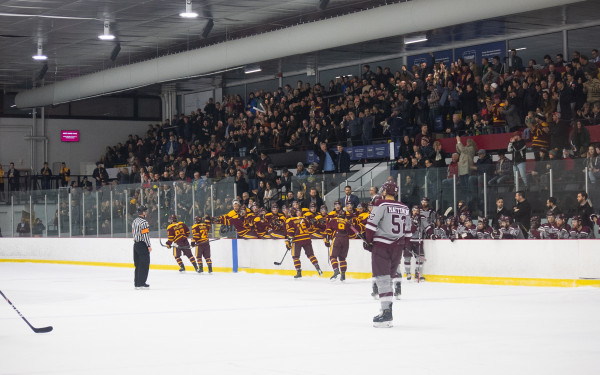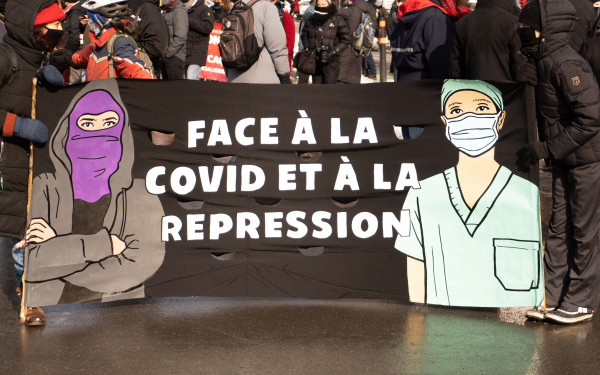Q&A with President Graham Carr
Courtesy Concordia University
What will this new school year look like as we return to campus?
With Concordia offering courses in-person, online, and in a blended format, students are left wondering what the fall semester will look like. The Link sat down with Concordia president and vice-chancellor Graham Carr about what students can expect from their return to campus and how learning will be accessible to students in varying situations.
Answers have been edited for length and clarity.
What are some of the biggest challenges that the administration is facing this coming year?
The challenge for everyone is we're going to have two cohorts of students coming to Concordia this fall who, over the course of the last 18 months, have been in a mostly online environment, whether that's students who were at Concordia, students who were in CEGEP or high schools elsewhere.
I think the biggest challenge by far is to figure out how we transition out of what we've experienced, to a campus experience which has much more in-person opportunities for students, faculty, and staff, while at the same time being prudent in terms of health and safety concerns.
We've gotten some updates by email over the last couple of months. Will the return to in-person learning be more flexible?
One thing that is set in stone in terms of health and safety measures is that everyone on campus will be required to wear a mask unless there's a two metre separation. In the case of a classic lecture hall situation where the faculty member is at the front of the room, they could remove their mask. That's consistent with the guidelines set by the Commission des normes, de l’équité, de la santé et de la sécurité du travail, which is responsible for setting health and safety guidelines for workplaces.
With regard to the delivery of courses, each of the faculties worked over the summer very closely with departments to design a schedule which they felt would work best for their students and their faculty. The delivery of courses in the fall is going to be mixed, which I think is typical of what we'll see in Canadian universities. More than 60 per cent of our courses will be in person.
One of the new things this fall is we'll have more courses that are being delivered in a blended format. There will be components of courses that are offered online, but other components of courses that require and provide opportunities for students will be in person and on campus.
What kind of resources will be available for students to successfully transition to in-person learning?
We spoke to students, and overwhelmingly what we heard back is that it's the campus experience that students felt deprived of, such as the opportunity to be at Loyola or downtown, to meet friends, to do things casually, to get together. So one of the things that we're certainly trying to do is work with the departments, with the Dean of Students Office and Student Success Office to ensure as much as possible that we can provide students with those kinds of opportunities.
I think we need to be frank about the reality that the next two weeks are a little bit unpredictable. We know from surveys that we've done with students—and frankly surveys that we've done with our faculty and staff—that there's a spectrum. There’s a desire at one end and anxiety at the other about coming to campus in person. I think we need to be mindful of that.
Is there any way that Concordia can help international students unable to make it back to Montreal for the start of the upcoming semester?
For international students, whether they're studying at Concordia or elsewhere in Quebec or Canada, there are certain requirements for visa processing that need to be met. Normally, international students who are full-time students are expected to be in Montreal as per their visa requirements.
Because there are severe challenges, and in some cases restrictions on international student travel, both the federal government and the government of Quebec made announcements over the course of the summer that it would be possible for international students to begin their studies remotely. It would not count against them in terms of their processing of visas and applications for permanent residency.
However, that was not an open-ended offer. And so the message that we're sending out to students, international students in particular, is that you will need to be in Montreal by Nov. 8, which is the drop deadline in order for you to be considered a full-time student at Concordia. What that's done is provide students with a little extra window of time to make travel arrangements, and try to secure housing arrangements in the city as well.
For international students who live in areas where Wi-Fi or up-to-date devices are inaccessible, how will the school help support these students until they get the chance to come back to Canada?
That's been an important question, not just for international students, but for domestic students as well. In the design of the schedule for the fall, all of the faculties worked with departments to ensure that there would be a certain number of courses that were available online. Students who won't be physically in Montreal will still be able to begin their studies.
We encourage faculty to apply the same best practices that we've been encouraging them to do in the past, which is to try to develop courses offered asynchronously, and that can be recorded so that if a student has a poor Internet connection, they’ll still have the opportunity to nevertheless capture the material.
The Concordia Student Union and administration have had conversations about the return to campus. Can you tell us a bit more about those meetings?
We actually began meeting regularly with the general coordinator of the CSU and also with the heads of the Graduate Student Association going back to 2019. We were meeting on a monthly basis at that time. When the pandemic began, we intensified those meetings so that we were meeting at a minimum every two weeks or as needed because the situation was evolving.
I think it's been really mutually beneficial because although we like to believe that we're very closely in touch with our students, students come to the CSU or to the GSA with other kinds of concerns. I think it's really good practice, pandemic or not, to keep those conversations going.
Students have complained about teachers lacking compassion and understanding during online learning. Has the university provided more training to ensure that this doesn't persist?
From a student perspective, [training] meant faculty members being more understanding of the challenges that they may be facing while trying to function in the online environment. From the faculty standpoint, it often meant trying to persuade students that although social media and digital tools are available 24/7, that doesn't mean that faculty members should be expected to respond in the blink of an eye to every kind of question.
We've certainly talked a lot about best practices with faculty members, many of whom have availed themselves of the services of the Centre for Teaching and Learning. Sometimes, whole departments meet with CTL.
I think people have also, I hope, learnt something from their personal experience over the last 18 months in terms of the need to be compassionate and understanding. It's been a tough period for everybody.
How do you think Concordia performed through this pandemic?
I'm proud of the way the university has come through it. I'm proud of our students who graduated in record numbers this year. I'm proud of the faculty and the staff who figured out how to deliver good quality education and sustain the services at the university.
[If] we've learnt one very important lesson, I hope it's the lesson of respect and understanding and compassion, and that flexibility is not the enemy of excellence.
There seems to have been a disconnect between students and professors throughout this past year. What frustrations have you heard from faculty and students and how can that be remedied going forward?
One of the things that we've learned from students is that many actually appreciate the flexibility that online learning affords them in terms of time management, travel, et cetera. We know that some students detest the online environment. They wanted face to face classes, that's how they learn better.
We knew this before, but I think the pandemic has allowed us to understand even better that people learn in different ways. And if you want to put students' success at the heart of learning, then you need, as a university or as a faculty, to recognize that it's important to have flexible options for students.
I think the biggest complaint we've heard from faculty members about remote learning over the last 18 months is the personal disconnect with students. Not having students face to face in the class to speak with, to talk to, which is the same social frustration that I think we've all experienced through the pandemic.
I was at a meeting with one of the departments in engineering over the course of the summer. Interestingly, what the department chair said was they had discovered that, in many ways, they can deliver the content of the lecture portion of their courses effectively online.
It allowed them to rethink what they wanted to accomplish with those students’ in-person activities on campus, and allowed them to put more emphasis on the quality of that in-person experience. So I think if anything, faculty members had the chance for reflection. They're experimenting with new models of teaching, and realizing the importance of flexible learning modalities. That's good for higher education generally, and that's good for Concordia's students in particular.
This summer has been overtaken by difficult conversations surrounding Indigenous communities and the discovery of mass graves across the country, and Concordia has yet to speak out. What has prevented Concordia from speaking on the issue?
We are speaking to that issue through the Indigenous Directions Action Plan. Phase two of that plan was relaunched this May.
Specifically on the question of the discoveries at the residential schools at the end of June, Manon Tremblay, the senior director of Indigenous Directions and I wrote a letter to the community about the university’s response to the challenges with truth and reconciliation.
Indigenous questions are really critical for Concordia, but there are many other marginalized communities that we need to be very supportive of. As you probably know, we have a task force on anti-Black racism that is submitting a preliminary report to the provost over the course of the summer. One of the things that I’m really determined that we as a community focus on in the fall is ensuring a respectful return to campus for everybody.
Many of our students and colleagues have had a really difficult time over the last 18 months, in part because of COVID-19, but also because of many of the other social issues, wars, and natural disasters. So one of the things I think we all need to do as a community is make a commitment to be respectful and be understanding of what those different experiences are, and to be supportive of each other as we move forward.




